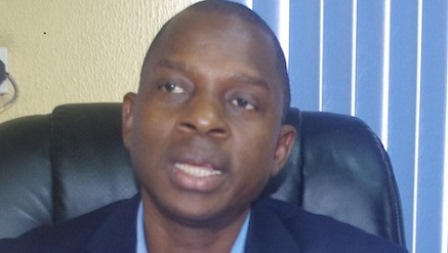E-Financial
Upperlink to Provide State Govts with Improved TSA Solutions

Upperlink Limited, has shown its readiness to provide state governments with an improved Treasury Single Account [TSA] solutions, even as the company have won the 2019 edition of Central Bank of Nigeria [CBN]’s Electronic Payment Incentive Scheme (EPIS) Efficiency Awards recently.
The CBN organised the awards to celebrate financial institutions, fintech firms and other stakeholders who are in the forefront of driving electronic payments in Nigeria.
A statement signed by the MD/CEO of the company, Mr. Segun Akano said the company “is passionate about helping state governments with improved TSA solutions as the conversation with some of the states’ ministry of finance have shown that they want an improved TSA over what the federal government is currently implementing”.
He explained that the award-winning e-payment solution, PayChoice-BAMS, is an improved TSA platform, as it keeps all accounts in different banks but “the aggregate balance is visible on one window”.
According to Akano, this window gives the states government full control over their funds by “allowing sweeping across banks or across accounts. It provides trend analysis about in-and-out movements in each account across all the banks”.
In its fourth year, the CBN awards are based on objective analysis of all electronic-payments data collated by the Nigeria Interbank Settlement Systems (NIBSS) over a full calendar year.
Upperlink emerged winner in the Cashless Driver Award: Non-Bank Payment Operator Award – Payment Solution Service Providers (PSSP) category.
“We are proud to be recognized by the CBN for our efforts in driving excellence in electronic payments and providing our clients with a superior non-banking experience across digital touch-points.
“The award serves as extra motivation for us and we will continue to find new and exciting ways to delight our clients in digital payment solutions”, Akano said.
He explained that the platform makes disbursement easy to vendors, contractors and to pay staff salaries while allowing the tax components and other deductibles of all payments to be remitted seamlessly in real time to the respective beneficiaries.
“Our PayChoice-BAMS platform helps users to carry out transactions in real-time while observing all the protocols pertaining to signatories and mandates of the state in a secured manner”.
He added that the platform has become so valuable to state governments because it allows the states to keep their trade obligations with the respective banks.
“The ripple effects are that the banks that have set up branches in these states remain in business, keep their staff, and even employ more indigenes to improve the economy of the state, enhance payee and boost micro economic activities”, he emphasised.
He informed that blue chips in the oil and gas, manufacturing and services sectors that maintain accounts across multiple banks have found PayChoice-BAMS useful.
“Its key functionalities have proven invaluable for many chief financial controllers who are seeking the ability to view all the company accounts across the multiple banks through one single view, make multiple transactions, track balances in real-time, generate statistics and prepare payment data analytics for the management team”, he said.
E-Financial
FCMB Group Redefines Corporate Storytelling with The Power Of The Group TVC

For decades, financial institutions have struggled to communicate the depth and breadth of their services in a single, coherent message.

FCMB Group’s latest TVC, The Power Of The Group, masterfully accomplishes this by placing its subsidiaries at the heart of the narrative.
The ad opens with a heated basketball game with a lone basketballer then pans out to the full force of the 5-woman team, subtly introducing the idea of collaboration. As the story unfolds, viewers are taken on a journey across Taraba, Abuja and Lagos States, each symbolising a key aspect of FCMB’s ecosystem.
The imagery of the drummers playing on Mambila Plateau reinforces the brand’s message: success is not achieved in isolation—it’s built through strategic partnerships.
From banking to consumer finance, investment management to investment banking, the TVC seamlessly weaves in elements from all arms of the FCMB Group, making it clear that power lies in collaborative innovative efforts.
The tagline ‘The Power Of The Group’ encapsulates the campaign’s essence, reinforcing the importance of unity in financial empowerment.
The production process was an extensive undertaking, requiring 4 months of production and a team of over 1,000 industry professionals.
The investment, said to run into hundreds of millions, underscores the bank’s commitment to delivering not just a commercial but a landmark campaign that defines its brand for years to come.
As the industry takes note, FCMB Group’s approach could redefine how corporate Nigeria tells its story.
E-Financial
CBN Warns Banks, Fintechs on Compliance with Sanctions

Central Bank of Nigeria (CBN) has reminded banks, payment service banks, and fintech companies of their obligations to comply with applicable sanctions regimes.

These sanctions include the United Nations Consolidated Sanctions List, the Nigerian Sanctions List in line with the Terrorism (Prevention and Prohibition) Act 2022, and guidelines on targeted financial sanctions related to terrorism and its financing.
This was contained in a letter dated April 17, 2025 and signed by Amonia Opusunju for the director of the Compliance Department.
The CBN directed all financial institutions to ensure strict adherence to sanctions lists maintained at both international and national levels.
According to the apex bank, financial institutions are expected to regularly update their systems to identify designated persons or entities and prevent the misuse of financial platforms to facilitate illegal transactions.
The letter read: “Financial Institutions are required to maintain a robust and dynamic sanctions compliance framework that enables them to Identify and respond promptly to updates or changes across all applicable sanctions lists; Prevent the use of their systems and platforms for transactions involving designated individuals or entities; Conduct real-time screening of customers, transactions, and beneficial owners; and File appropriate reports with the Nigerian Financial Intelligence Unit (NFIU) and notify the CBN, where necessary.”
The CBN’s directive also covers real-time screening of customers, transactions, and beneficial owners.
Institutions are to report suspicious activities to the Nigerian Financial Intelligence Unit (NFIU) and notify the apex bank where necessary, the apex bank warned.
According to the bank, non-compliance with the regulations could attract sanctions in form of enforcement actions or regulatory penalties.
It added that sanctions compliance frameworks must be periodically reviewed and aligned with prevailing laws and regulatory expectations.
The CBN advised all financial institutions to take note of the guidance and act accordingly.
“This letter serves as a regulatory reminder and all Financial Institutions are expected to ensure continued compliance with applicable laws and CBN directives,” the apex bank stated.
E-Financial
How CBEX Operators ‘Enticed’ Victims –SEC

Securities and Exchange Commission (SEC) says preliminary investigations revealed that Crypto Bridge Exchange, aka CBEX, engaged in promotional activities to create a ‘false perception of legitimacy’ to entice ‘unsuspecting’ Nigerians.

About N1.3trillion was reportedly wiped out from the investors’ account after the platform, which boasted of giving investors 100 per cent Return On Investment in 30 days crashed on Monday.
The SEC stated that CBEX was not granted registration by the commission at any time to operate as a Digital Assets Exchange.
In a circular dated April 17, 2025, the commission stated that its attention was drawn to recent media reports/publications on the activities of CBEX (Crypto Bridge Exchange).
According to the SEC, “The commission hereby clarifies that neither CBEX nor its affiliates were granted registration by the commission at any time to operate as a Digital Assets Exchange, solicit investments from the public or perform any other function within the Nigerian capital market.”
The agency said, “Preliminary investigations carried out by the commission have revealed that CBEX engaged in promotional activities to create a false perception of legitimacy, in order to entice unsuspecting members of the public into investing monies, with the promise of implausibly high guaranteed returns within a short timeframe.”
The SEC emphasised that pursuant to the provisions of Section 196 of the Investments and Securities Act 2025, the commission would collaborate with relevant law enforcement agencies to take appropriate enforcement action against the CBEX, its affiliates and promoters.
“The commission uses this medium to remind the public to REFRAIN from investing in or dealing with any entity offering unrealistic returns or employing similar recruitment-based investment models.”
Dr. Emomotimi Agama, director general, SEC, had recently said the commission is launching a more forceful and coordinated enforcement regime against unregistered and illegal “phony” investment schemes, otherwise known as ponzi schemes.
Agama said with the newly enacted Investments and Securities Act, 2025 (ISA 2025), the Commission now has enhanced powers to prosecute Ponzi schemes and their promoters.
He said investigations were ongoing on CBEX, adding that promoters of the failed scheme will not go scot-free.
Agama said the new law has given the commission more powers and blocked loopholes in emerging areas of virtual and digital assets.

 Telecom2 days ago
Telecom2 days agoSalesforce Revolutionizes Business Intelligence with AI-Powered Tableau Next

 Broadcasting2 days ago
Broadcasting2 days agoMultiChoice Brings Easter Home with Dedicated Pop-Up Channel

 News2 days ago
News2 days agoAirtel Smartcash Set to Power Stress-Free Easter with Seamless Cashflow

 E-Business2 days ago
E-Business2 days agoDG NITDA Tasks Africa to Lead the AI Revolution Through Strategic Leadership, Inclusive Innovation

 E-Financial2 days ago
E-Financial2 days agoHow CBEX Operators ‘Enticed’ Victims –SEC

 E-Business2 days ago
E-Business2 days agoGoogle Blocks 5.1Bn Harmful Ads in 2024, Suspends 39m Accounts

 Telecom2 days ago
Telecom2 days agoTemu and Shein Raise U.S. Prices Amid Trump-Era Tariffs

 E-Financial2 days ago
E-Financial2 days agoCBN Warns Banks, Fintechs on Compliance with Sanctions






















